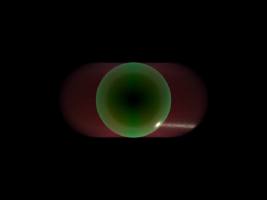Example Usage
This is an example of the usage of my research and development version of rigo, my pure go implementation of Pixar’s RenderMan Interface.
> go get gitlab.com/mae.earth/rigo
package main
import (
"gitlab.com/mae.earth/rigo/ri"
"gitlab.com/mae.earth/rigo"
)
func main() {
ctx := rigo.New()
ctx.Begin("test.rib")
ctx.ArchiveRecord(ri.STRUCTURE,ri.RIB)
resolution := ctx.Declare("resolution","constant float[2]")
ctx.Declare("baseColor","color")
/* inline rib archive */
archive1 := ctx.ArchiveBegin("lighting")
ctx.AttributeBegin()
ctx.ArchiveRecord(ri.COMMENT,"this is our lights")
ctx.Translate(5,5,5)
ctx.Light("PxrEnvDayLight","light1")
ctx.Geometry("envsphere",resolution,[2]float64{1024,1024})
ctx.AttributeEnd()
ctx.AttributeBegin()
ctx.Translate(-5,5,-5)
ctx.Light("PxrEnvDayLight","light2")
ctx.Geometry("envsphere",resolution,[2]float64{1024,1024})
ctx.AttributeEnd()
ctx.ArchiveEnd()
ctx.Display("2_spheres.exr","openexr","rgba")
ctx.Format(640,480,1.0)
ctx.Projection("perspective","float fov",30.0)
ctx.Hider("raytrace","int maxsamples",64,"int minsamples",16,"int incremental",100,"float[4] aperture",[4]float64{0,0,0,0})
ctx.Integrator("PxrPathTracer","production")
ctx.Shutter(0,1)
ctx.System("date; echo starting job ^{Option:user:jobid}")
ctx.WorldBegin()
object := ctx.ObjectBegin()
ctx.Sphere(1,-1,1,360)
ctx.ObjectEnd()
ctx.ReadArchive("test2.rib",nil)
ctx.Translate(0,0,10)
ctx.ReadArchive(archive1,nil)
ctx.Illuminate("light1",true)
ctx.Illuminate("light2",true)
ctx.AttributeBegin()
ctx.MotionBegin(0.0,0.5,1.0)
ctx.Translate(1,0,0)
ctx.Translate(0,0,0)
ctx.Translate(-1,0,0)
ctx.MotionEnd()
ctx.Bxdf("PxrDisney","surface","baseColor",[]float64{1,0,0})
ctx.ObjectInstance(object)
ctx.AttributeEnd()
ctx.AttributeBegin()
ctx.Bxdf("PxrDisney","surface_2","color baseColor",[]float64{0,1,0})
ctx.Sphere(1,-1,1,360)
ctx.AttributeEnd()
ctx.WorldEnd()
ctx.System("date; echo rendered job ^{Option:user:jobid}")
for {
if ctx.RicGetProgress() == 100 {
break
}
}
ctx.End()
ctx = rigo.New()
ctx.Begin("test2.rib")
ctx.ArchiveRecord("structure","RenderMan RIB")
ctx.ReadArchive(archive1,nil)
ctx.End()
ctx = rigo.New()
ctx.Begin("driver.rib")
ctx.ArchiveRecord("structure","RenderMan RIB")
ctx.Option("ribparse","string varsubst","^")
ctx.Option("user","string jobid","2_spheres")
ctx.End()
}
Running this go program will generate three rib files; driver.rib, test.rib and test2.rib. We can concat driver.rib and test.rib togeather to get a rib file that can be rendered.
> cat driver.rib test.rib > out.rib
##RenderMan RIB
Option "ribparse" "string varsubst" ["^"]
Option "user" "string jobid" ["2_spheres"]
##RenderMan RIB
Declare "resolution" "constant float[2]"
Declare "baseColor" "color"
ArchiveBegin "lighting"
AttributeBegin
# this is our lights
Translate 5 5 5
Light "PxrEnvDayLight" "light1"
Geometry "envsphere" "constant float[2] resolution" [1024 1024]
AttributeEnd
AttributeBegin
Translate -5 5 -5
Light "PxrEnvDayLight" "light2"
Geometry "envsphere" "constant float[2] resolution" [1024 1024]
AttributeEnd
ArchiveEnd
Display "test.exr" "openexr" "rgba"
Format 640 480 1
Projection "perspective" "float fov" [30]
Hider "raytrace" "int maxsamples" [64] "int minsamples" [16] "int incremental" [100] "float[4] aperture" [0 0 0 0]
Integrator "PxrPathTracer" "production"
Shutter 0 1
System "date; echo starting job ^{Option:user:jobid}"
WorldBegin
ObjectBegin "object#1"
Sphere 1 -1 1 360
ObjectEnd
ReadArchive "test2.rib"
Translate 0 0 10
ReadArchive "lighting"
Illuminate "light1" 1
Illuminate "light2" 1
AttributeBegin
MotionBegin [0 .5 1]
Translate 1 0 0
Translate 0 0 0
Translate -1 0 0
MotionEnd
Bxdf "PxrDisney" "surface" "baseColor" [1 0 0]
ObjectInstance "object#1"
AttributeEnd
AttributeBegin
Bxdf "PxrDisney" "surface_2" "color baseColor" [0 1 0]
Sphere 1 -1 1 360
AttributeEnd
WorldEnd
System "date; echo rendered job ^{Option:user:jobid}"
Now we can render our image.
> render -d it -progress -maxsamples 512 out.rib
